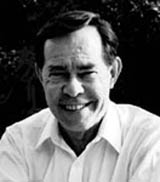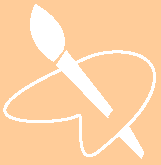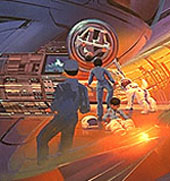|
Syd Mead
–
graphic arts designer
|

|
"
The single biggest problem in design is finding out from the client what it is that they really want.
" |

|
| |
|
|
|
| |
How were you motivated to become a graphics arts designer? |
| |
By the time I was four or five, my dad gave me some paper and I
was drawing pictures of 'scenic' views, with cars, houses, people, trees
and miscellaneous picture elements. I knew by the time I was in the
fifth grade that I would make my living drawing. I've always been
somewhat of an introvert, not being blessed with good looks or athletic
ability. As time went on and peer comparison became more of a big deal,
my internal world view became even more of a 'place to be.' Being able
to fabricate exact views of my worlds was enormously satisfying, made me 'interesting' to my peers, and somehow 'evened' the score.
The shift into industrial design was a transfer from 'liking cars and
rockets' to the window opened by mentors and professional instructors.
These remarkable people guided me to method without tampering with my
personal imagination, the hallmark of a good 'teacher.' The motivation?
A natural desire to create my own world and a nurturing home where both
parents encouraged what they had the sense to see was a demonstrable talent.
|
|

|
| |
|
|
|
| |
What can you share about your creative process? |
| |

|
|
First, you have to learn how to do it, which is technique. This means the materials and tactile skills that are going to be your transfer medium for the rest of your life. To play the piano, one must learn as second nature where all the keys are. By the time I entered the Art Center School in 1956, I had been drawing for eighteen years. I could then concentrate on technique and method without having to start from scratch.
The creative process is essentially enhanced memory coupled together with a personal viewpoint. The memory part is knowledge gained through reading, remembering specific scenarios, and listening to and retaining what people smarter than you relate. The personal viewpoint is personality, a highly complex phenomenon.
I start any project by gathering as much information as possible on a fast track uptake. I then pretend to forget all of it. My brain, of course does remember, but you must go outside the problem box to create new stuff that is familiar enough to relate to the real world. Then, when I have done a first round of crazy idea drawings, I sort them into best case related to the problem. Then, these are matched carefully to the actual problem guidelines and the actual documentation and execution proceed. In my entire professional career, I have been really wrong about three times and sort of wrong about four times. The single biggest problem in design is finding out from the client what it is that they really want.
|
|
| |
|
|
|
| |
What ideas do you have for a future human community on Mars?
|
| |
There is an ideal dynamic size for a community having to do with familiarity of face and habitual routine. The average person can stay mindful of about one hundred others without becoming overloaded with memory management. Above one hundred, a super–personal management system has to be set up, tending to create a vague 'them' entity. The community should have a varied interest spread among the inhabitants, and a kind of zeal motivation. Really large societies create their own choice buffer by virtue of many, many options for association and personality destinations. A smaller, more intimate society has to be more subservient to restrictive guidelines to be successful. Society IS the ultimate machine. Without a rational basis, the elaborate technology required to make the colony functional is beside the point.
My unique idea would be to set up an elaborate virtual place facility in the Mars Colony in which the inhabitants could occasionally leave and go someplace else. The emotional and psychological escape offered would, I think, be invaluable...literally. This soft facility will be the single most difficult item to acquire funding for, balanced against efficient project costs.
|
|

|
|




